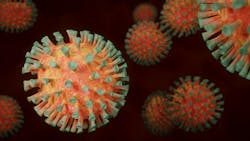AstraZeneca’s antibody combination effective in reducing risk of severe COVID-19 or death
New data from AstraZeneca show that the company’s long-acting intramuscular antibody combination, AZD7442, reduced the risk of severe illness or death in patients with COVID-19 and symptomatic illness when taken as a prophylaxis.
The data are from the AZD7442 COVID-19 PROVENT prevention and TACKLE outpatient treatment Phase III trials.
In an analysis of the ongoing PROVENT trial evaluating a median six months of participant follow-up, one 300mg IM dose of AZD7442 reduced the risk of developing symptomatic COVID-19 compared to placebo by 83%.
About 2% of the global population is considered at increased risk of an inadequate response to a COVID-19 vaccine. This includes people with blood cancers or other cancers being treated with chemotherapy, patients on dialysis, those taking medications after an organ transplant or who are taking immunosuppressive drugs for conditions including multiple sclerosis and rheumatoid arthritis.
The AZD7442 PROVENT trial is the first Phase III trial prospectively designed to evaluate a monoclonal antibody for pre-exposure prophylaxis of symptomatic COVID-19, with targeted inclusion of high-risk and immunocompromised participants. More than 75% of PROVENT participants at baseline had co-morbidities that put them at high risk for severe COVID-19 if they were to become infected, including people who are immunocompromised and may have a reduced immune response to vaccination.
There were no cases of severe COVID-19 or COVID-19-related deaths in those treated with AZD7442 at either the primary or six-month analyses. In the placebo arm, there were two additional cases of severe COVID-19 at the six-month assessment, for a total of five cases of severe COVID-19 and two COVID-related deaths.
An exploratory analysis of the TACKLE outpatient treatment trial, in patients with mild-to-moderate COVID-19, showed that one 600mg IM dose of AZD7442 reduced the risk of developing severe COVID-19 or death (from any cause) by 88% compared to placebo in patients who had been symptomatic for three days or less at the time of treatment.
A total of 90% of participants enrolled in TACKLE were from populations at high risk of progression to severe COVID-19 if they became infected, including those with co-morbidities.
AZD7442 is a combination of two long-acting antibodies — tixagevimab (AZD8895) and cilgavimab (AZD1061)— which was derived from B-cells donated by convalescent patients after SARS-CoV-2 virus. Discovered by Vanderbilt University Medical Center and licensed to AstraZeneca in June 2020, the human monoclonal antibodies bind to distinct sites on the SARS-CoV-2 spike protein and were optimized by AstraZeneca with half-life extension and reduced Fc receptor and complement C1q binding.

